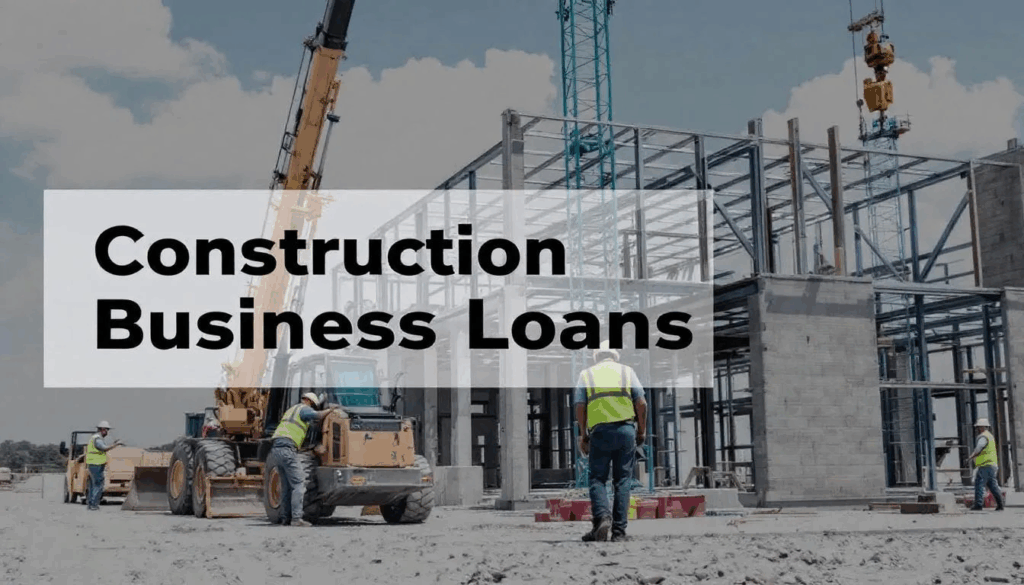What are Construction Business Loans?
Construction business loans are financing solutions designed to meet the capital needs of construction companies and contractors. These loans help construction and contracting businesses fund projects, purchase new equipment, manage payroll, cover materials, and more. Constructing projects may require a lot of upfront capital, which includes buying or leasing expensive equipment and having working capital for labor and materials.
Construction business loans can be used for a wide range of business purposes, including:
- Ground-up commercial or residential building projects
- Renovations and remodeling jobs
- Equipment purchases or leases
- Hiring subcontractors or expanding crews
- Bridging gaps between project payments
- Buying or leasing vehicles or heavy machinery
Common types of construction business loans include:
Commercial Construction Loan
A commercial construction loan is a loan that you can use as funding for your small business in the construction industry. These loans are typically used to finance commercial building projects and often disburse funds in stages based on project milestones.
Construction-Only Loan
These are short-term loans that cover only the building phase of a project. The borrower must repay the loan in full once construction is complete or refinance into permanent financing. Construction mortgage loans disburse funds over time, pending regular progress inspections, rather than as a lump sum payment.
Construction-to-Permanent Loan
With some loans, such as construction-to-permanent loans, you might only make interest-only payments during the construction phase. Once the project is complete, the loan converts to a long-term mortgage. Construction-to-permanent loans automatically convert to a mortgage when the project is finished, eliminating extra closing costs and application fees.
Renovation Loan
These loans are ideal for construction companies focused on remodeling and updating existing structures. Funds can be used for materials, labor, and equipment.
End Loan
An end loan is a traditional mortgage that pays off a construction loan after a building project is completed. It typically has longer repayment terms and fixed monthly payments.
Other Small Business Loans for Construction
In addition to the loans listed above, various other small business loans can provide the necessary capital to overcome cash flow issues and fund project completion.
Consider one of the following small business funding solutions:
Business Line of Credit: A business line of credit offers funding that construction businesses can draw against as needed and can be helpful to bridge cash flow gaps during seasonal slowdowns or delayed contract payments. This form of revolving credit is great for covering unexpected job site expenses or ongoing project needs.
Business Term Loan: A business term loan is paid out in a lump sum with steady monthly payments and can come in secured or unsecured forms. These loans are excellent for significant, one-time construction expenses like purchasing heavy equipment, hiring additional crews, or expanding operations.
Equipment Financing: Equipment loans help finance the purchase of new construction equipment or vehicles. The equipment itself serves as collateral, making it easier for construction companies to qualify without tying up other business assets.
Merchant Cash Advance: Merchant cash advances (MCAs) provide a lump sum payment in exchange for a portion of your future receivables. It’s useful for construction companies with consistent revenue from client contracts looking for fast access to capital.
Accounts Receivable Factoring: Accounts receivable factoring (also known as accounts receivable factoring) involves selling your outstanding construction invoices to a factoring company in exchange for upfront cash. Ideal for firms waiting on delayed payments from clients or general contractors.
Revenue Based Financing: Revenue based financing provides capital in exchange for a percentage of your construction company’s future revenue. Repayment adjusts based on job income, making it flexible for businesses with fluctuating cash flow.
Working Capital Loans: Designed to cover everyday construction business needs, working capital loans help with payroll, purchasing materials, covering subcontractors, and other short-term obligations when project income is delayed.
How do Construction Business Loans work?
Construction business loans typically work by providing funding in one of two ways: either as a lump sum or in staged disbursements as the project progresses. Many construction loans are short-term and convert to long-term financing once the project is completed or reaches maturity and must be refinanced.
Here’s a general step-by-step breakdown of business loans for a construction company:
- Apply for a Loan: Apply with the lender, including financial documents, business plan, and project proposal.
- Underwriting & Approval: The lender evaluates your credit, business revenue, project feasibility, and other eligibility requirements.
- Loan Disbursement: Funds are either released all at once or in phases based on construction progress.
- Interest Payments: With some loans, you only pay interest during the construction phase.
- Project Completion: Once construction is done, the loan may be repaid or converted into a permanent loan.
- Repayment: Borrowers repay the loan over the agreed term with fixed or variable payments, depending on the loan type.
Construction Business Loan Example
Let’s say ABC Construction secures a $500,000 commercial construction loan to build a new office building for a client. The lender agrees to disburse the loan in stages: 25% upfront for groundwork, 25% after framing, 25% after electrical/plumbing installation, and the final 25% upon project completion.
During the project, ABC Construction only needs to pay interest on the amount disbursed. Once construction is complete, the loan converts to a permanent loan with monthly payments over 15 years. This allows ABC Construction to preserve working capital during the project while securing long-term financing.
How do Construction Companies qualify for Business Loans?
Qualifying for a construction business loan depends on several factors, including your financial profile, business history, and the details of your project. Lenders want to ensure you have the experience, revenue, and resources to complete the project and repay the loan.
Here are typical eligibility requirements:
- Credit Score: A good credit score (650+) improves your chances, but bad credit options exist.
- Time in Business: Most lenders prefer companies with at least 1-2 years in operation.
- Revenue: Stable monthly or annual revenue shows your business can handle repayment.
- Collateral: Some loans require collateral, such as equipment or real estate.
- Down Payment: Many construction loans require a down payment of 10%-30%.
- Project Feasibility: A detailed construction plan, budget, and timeline are often required.
- Business Type & Location: Eligibility for loans usually depends on the business’s income-generating activities, ownership structure, and operating location.
What are the advantages of Construction Business Loans?
Construction business loans provide much-needed funding for cash-intensive projects, allowing businesses to start or complete jobs without straining day-to-day operations. They can be customized to match project timelines and often offer favorable repayment terms. Some loans disburse funds gradually, reducing the interest burden and aligning with construction progress. They also give construction firms the flexibility to invest in new equipment, expand operations, or cover unexpected costs.
What are the disadvantages of Construction Business Loans?
The application process for construction loans can be lengthy and require significant documentation. Some loans involve higher interest rates or large down payments. Many lenders require strong credit, which can make it difficult for newer or struggling businesses to qualify. Additionally, staged disbursements may cause cash flow issues if construction hits delays. Finally, many loans require collateral, increasing risk if the business defaults.
Construction Business Loan Pros & Cons
Pros:
- Access to large loan amounts
- Flexible repayment terms
- Interest-only payments during construction
- Supports business growth and expansion
- Can improve cash flow and bridge payment gaps
Cons:
- May require strong credit and collateral
- Can involve complex underwriting
- Funds disbursed in stages, not a lump sum
- High down payment requirements
- Interest rates may be higher for short-term loans
How can my Construction Company apply for a Business Loan?
You can apply for an online construction business loan through our lender network. Below, we’ll explain how to apply for each product and the required documents.
Step 1: Choose the Right Product
The first step is choosing the right product for your needs and goals. This should require decent research, as each product is designed for different financial circumstances and cash flow cycles. Does your business experience occasional dips in revenue? Is your business highly seasonal?
You should also consider the purpose of the funds. How long will it take you to pay off the loan? This will help us determine the right borrowing amount and terms for you.
Step 2: Gather Your Documents
Here are the documents required for the different loan products:
- DriDriver’scense
- Voided business check
- Bank statements (past three months)
- Business license or certificate
- Business tax returns (past three years)
- Personal tax returns (past three years)
- Credit report or statement of personal credit history
- Income statements
- Current Profit & Loss Statements and Balance Sheet (Year-to-Date)
- Accounts Receivable (A/R) and Accounts Payable (A/P) reports
- Credit card processing statements (length of history may vary)
- Personal financial statement
- Business plan (may not be required in all cases)
- Debt schedule
- List of real estate owned
- Deeds, title, or ownership documentation for collateral/security
- Lease or rent documentation
- Invoice for equipment (for equipment financing specifically)
Step 3: Fill Out Application
You can begin the application process by calling us or filling out our one-page online application. Either way, you’ll be asked to enter the information from the previous section along with your desired funding amount.
Step 4: Speak to a Representative
Once you apply, a representative will contact you to explain the repayment structure, rates, and terms of your available options. This way, you won’t have to worry about surprises or hidden fees during repayment.
Step 5: Receive Approval
If approved, you’ll hear back from us within 24 hours. Funds for Business Term Loans, Business Lines of Credit, Working Capital Loans, and Equipment Financing should appear in your bank account anywhere from 24 hours to one week. It typically takes 8-12 weeks, at the very least, for SBA Loans to receive funding.
Frequently Asked Questions
Here are the most common questions about construction business loans.
How can Construction Companies use Business Loan funds?
Construction companies can use business loan funds for a variety of purposes that support operations and growth. Funds can cover equipment purchases, payroll, subcontractors, materials, or bidding on new projects. Loans can also help you refinance existing debt, purchase new vehicles, or open new locations.
Having access to capital enables construction firms to remain competitive, bid on larger jobs, and keep projects on schedule, even during slow seasons or payment delays.
What are the costs of Business Loans for Construction?
The cost of a construction business loan varies based on loan type, amount, lender, and borrower qualifications. Expect the following potential expenses:
- Interest Rates: Vary from 5% to 30%+ depending on credit and loan structure
- Origination Fees: Often 1% to 5% of the loan amount
- Closing Costs: Common for SBA and commercial loans
- Draw Inspection Fees: For staged loans
- Late or Early Payment Fees: Based on your repayment terms
The length of time to repay loans varies by type; short-term lines of credit can be repaid in six months or less, while commercial mortgages are often repaid over five to 20 years.
Can Construction Companies get SBA Loans?
Yes, construction companies can qualify for SBA loans backed by the Small Business Administration. SBA loans often offer low interest rates and are available for construction businesses through Standard 7(a) and CDC/504 loan types. The SBA loan program is usually considered the gold standard of small business loans.
These loans are issued by banks, credit unions, or alternative lending facilitators, but are partially guaranteed by the SBA, reducing the lender’s risk. This allows for more favorable loan terms, including longer repayment terms and lower rates, even for small businesses that may not qualify for traditional financing.
SBA 7(a) Loans: The SBA 7(a) loan is the most popular option and can be used for working capital, equipment purchases, or refinancing debt. Loan amounts can reach up to $5 million with terms up to 25 years.
SBA 504 Loans: The SBA 504 loan is designed for purchasing fixed assets like real estate or large equipment. These loans are ideal for construction firms looking to buy warehouses, offices, or heavy machinery.
Can I get a Construction Business Loan with Bad Credit?
Yes, it’s possible to get a construction business loan with bad credit. While traditional banks may deny you, alternative lenders often offer financing to businesses with lower credit scores. Options like merchant cash advances, invoice factoring, and revenue-based financing are more credit-flexible.
Keep in mind that these loans may carry higher interest rates and shorter repayment terms, but they can still provide the funds needed to keep your business running.
Construction Business Loans – Final Thoughts
Whether you’re building from the ground up, remodeling existing properties, or simply keeping up with day-to-day operations, construction business loans can provide the capital your company needs to grow and thrive. These financing options are especially vital for managing the cash flow challenges that come with long project timelines and upfront expenses.
By understanding how these loans work, comparing your options, and choosing the right lender, you can secure funding that supports your business goals. The right financing solution can help your construction firm succeed, from breaking ground to final inspections.
Contact us if you have more questions or if you’re ready to apply for a small business loan. Our alternative financing experts can help you find the best loan for your construction needs.












